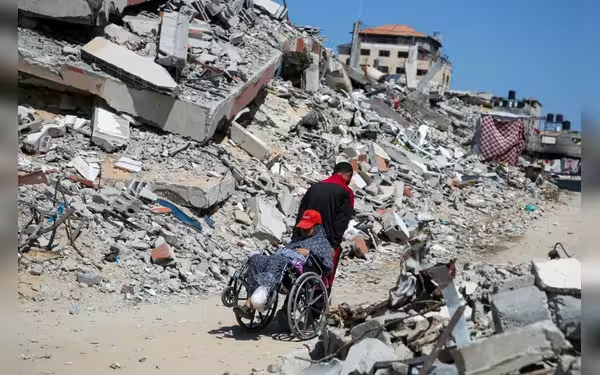Sunday, December 22, 2024 09:26 AM
Gaza's Disabled Face Dire Humanitarian Crisis
- Over 22,500 injured in Gaza conflict.
- Healthcare system devastated, professionals killed.
- Urgent need for medical assistance and support.
 Image Credits: thefrontierpost
Image Credits: thefrontierpostThe ongoing Gaza conflict has severely impacted individuals with disabilities, highlighting urgent medical needs and humanitarian crises.
The ongoing conflict in Gaza has escalated into a humanitarian crisis, particularly affecting individuals with disabilities. Over 400 days of relentless Israeli air strikes and ground invasions have resulted in a staggering number of casualties and injuries. More than 22,500 people have sustained life-altering injuries, while hundreds of individuals with pre-existing disabilities have either lost their lives or remain trapped under rubble. The situation is dire, with 90% of Gaza’s population displaced, some families forced to move as many as 20 times. This constant upheaval has severely hindered the mobility of people with disabilities, making it nearly impossible for them to escape when ordered by the Israeli military.
The destruction of Gaza's infrastructure has not only impacted the general population but has also obliterated the healthcare system that once provided essential services to those with disabilities. Many professionals dedicated to this field have been killed, further exacerbating the plight of vulnerable individuals. A tragic example is Hashem Ghazal, the founder of the Atfaluna Society for Deaf Children, who was killed in an air strike along with his wife. His loss is felt deeply within the community, as he was known as the "spiritual father of deaf people in Gaza."
Personal stories from those affected paint a harrowing picture of survival amidst chaos. Azmi Aljamal, a nine-year-old boy, was pulled from the rubble of his family home after it was targeted by missiles. He lost several family members in the attack and now requires surgery for his injuries but cannot leave Gaza for treatment. His father, Mousa, expressed the challenges they face, stating, "He needs special care, for instance, he needs a particular type of diaper, he is on a specific diet and needs vitamins which are not available." Azmi dreams of walking again, a hope that seems distant in the current circumstances.
Another poignant story is that of Mahmoud Adnan Shokor, a 31-year-old paraplegic who has seen his condition worsen since the conflict escalated. After an air strike destroyed his family home, he was rescued from the rubble, but his access to medical care has been severely limited. His mother shared, "He cries every day, and when it is time to escape and bombing is close, he cannot run for his life." The emotional and physical toll on Mahmoud and his family is immense, highlighting the urgent need for medical assistance.
Reem Ayad, a ten-year-old girl, suffered a devastating injury when her home was bombed. She lost her right hand and now requires a prosthetic limb to regain some semblance of normalcy. Her father, Kamal, described the harrowing experience of fleeing with his injured daughter, stating, "Reem needs vitamins, food and medicines that are not available, and she needs to get an injection to stop the growth of the hand bone so that it does not tear the skin." The lack of basic medical supplies is a recurring theme in the stories of those affected.
Amina Omar, a nine-year-old girl with cerebral palsy, faces her own set of challenges. Her mother, Najah, had to carry her while fleeing from Israeli tanks, and the stress of survival has taken a toll on their health. Amina struggles with malnutrition and requires a wheelchair, which is currently unattainable. The daily struggle for food and medical care is a constant source of worry for her family.
These stories are just a glimpse into the lives of thousands of Palestinians with disabilities who are enduring unimaginable hardships. The ongoing conflict has disproportionately affected this vulnerable group, leaving them without the necessary care and support. Despite the dire circumstances, the resilience and courage displayed by families caring for their loved ones are truly inspiring.
As the world watches this humanitarian crisis unfold, it is crucial to amplify the voices of those affected. The international community must respond to the urgent pleas for help from all Palestinians, including those with disabilities. It is imperative to advocate for an arms embargo on Israel and push for a permanent ceasefire to alleviate the suffering of innocent civilians. The stories of Azmi, Mahmoud, Reem, and Amina serve as a reminder of the human cost of conflict and the urgent need for compassion and action.













